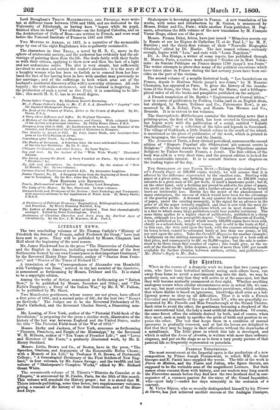tOt ffiyratrrs.
When in the course of a dramatic work we learn that two young per- sons, who have been betrothed ,wIthent seeing each others faces, run away from home to avoid a matrimonial leap into the dark, we may be perfectly sure, not only that they will arrive at at the same spot, but that they will become mutually enamoured at first sight. Whether anything analogous occurs when similar circumstances arise in actual life, we can- not say, but most certainly there is a dramatic providence, which ordains, that where dislike is based on ignorance, knowledge shall arise as a bel- ligerent power to clear up all difficulties. Thus it is with a French Chevalier and demoiselle of the age of Louis XV., who are gracefully re- presented by Mr. Parselle and Miss Swanborough at the Strand Theatre. Each tries to avoid the other, the gentleman becoming a shepherd of the most conventional kind, the lady a most artificial shepherdess. Of course, the same forest offers the solitude desired by both, and of course, when they meet, each is ready to sacrifice the pride of birth and position to es- pouse the other. The veil that keeps them in a condition of mutual ignorance is gradually removed, and at last the lovers are delighted to find that they may be happy in their affections without the drawbacks of a misalliance. The little piece in which this tale is developed, and which is called the Loves of Arcadia, is written with more than ordinary elegance, and put on the stage so as to form a very pretty picture of that pastoral life so frequently represented on porcelain.


























 Previous page
Previous page